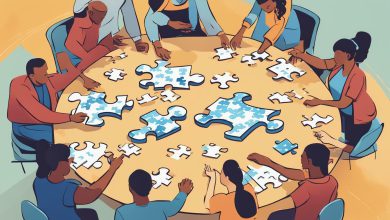
Leadership is a crucial aspect of professional success, and developing effective leadership skills is essential for anyone looking to make a lasting impact in their field. The good news is that leadership development training and coaching can help you become a better leader.
In this guide, we will explore various strategies and approaches to enhance your leadership skills. We will discuss the importance of leadership development training programs and the role of coaching in developing effective leadership strategies.
Key Takeaways:
- Developing effective leadership skills is crucial for professional success.
- Leadership development training and coaching can enhance your skills.
Understanding the Key Components of Effective Leadership
Effective leadership is a key driver of success in any organization, and developing strong leadership skills is crucial for anyone who seeks to take their career to the next level. In this section, we will discuss the key components that make a leader effective and explore various strategies for developing and enhancing leadership skills.
Effective Leadership Strategies
Effective leadership strategies are rooted in a combination of innate personality traits and learned behaviors. Some of the most important traits of effective leaders include strong communication skills, the ability to motivate and inspire others, and a willingness to take calculated risks. In addition to these traits, successful leaders also possess a deep understanding of their industry and the specific challenges and opportunities that it presents.
Developing these key components of effective leadership requires ongoing effort and commitment. One strategy for enhancing leadership skills is to engage in regular self-reflection and self-assessment. This can help you identify areas of strength and weakness and develop a plan for improvement.
Leadership Skills Development
Leadership skills development can take many forms, from attending training courses and seminars to seeking out mentorship opportunities and regularly practicing new skills. Regardless of the specific approach, ongoing learning and development are essential for cultivating strong leadership skills.
One effective strategy for leadership skills development is to seek out feedback from colleagues, mentors, and other trusted sources. This can help you identify areas for improvement and refine your leadership style over time.
Overall, effective leadership requires a combination of natural talent, learned skills, and ongoing effort and commitment. By understanding the key components of effective leadership and engaging in ongoing skills development, anyone can become a more effective leader and achieve greater success in their personal and professional lives.
Leadership Development Training: A Path to Success
In today’s competitive business environment, developing effective leadership skills is critical for professionals seeking to advance their careers. One way to achieve this is through participating in a leadership development program. These programs offer leadership skills training and leadership training courses that help individuals enhance their leadership skills and build their confidence as leaders.
Leadership development programs are designed to provide participants with the knowledge and skills they need to become effective leaders. These programs cover a wide range of topics, including leadership styles, communication, team building, problem-solving, and decision-making. Participants learn from experienced leaders and experts in the field, and they have the opportunity to apply their new skills in a supportive and structured environment.
Leadership skills training is an essential component of any leadership development program. These training sessions are designed to help participants develop specific leadership skills and learn how to apply them in real-life situations. Leadership skills training can cover topics such as time management, conflict resolution, delegation, and motivation, among others.
Leadership training courses are another important part of a leadership development program. These courses are usually focused on a specific topic or skill and are designed to deepen participants’ knowledge and expertise in that area. For example, a leadership training course might focus on effective communication skills or how to build and lead high-performing teams.
Enrolling in a leadership development program gives individuals the opportunity to learn and grow as leaders. These programs offer a supportive environment where individuals can gain new insights, develop new skills, learn from experienced leaders, and build their network of professional contacts. With the right training and support, anyone can develop effective leadership skills and achieve success in their chosen field.
The Role of Leadership Coaching
Leadership coaching plays a vital role in developing effective leadership skills. It provides a personalized approach to enhancing leadership skills and can help leaders identify areas of improvement and develop strategies to overcome obstacles.
Effective leadership strategies involve constant reflection and improvement. Leadership coaching helps leaders achieve this by providing a safe and supportive environment to explore their strengths and weaknesses, receive feedback, and develop a plan for growth.
Coaching can take various forms, including one-on-one sessions, group coaching, and peer coaching. Each approach has its unique benefits and can be tailored to suit an individual’s needs and goals.
Whatever the format, effective coaching should focus on building self-awareness, fostering a growth mindset, and developing actionable plans for improvement.
Leadership coaching can be incorporated into leadership development programs to enhance their effectiveness. It can also be utilized to address specific areas of improvement, such as communication, decision-making, or conflict resolution.
By investing in coaching, leaders can accelerate their development and create a positive impact on their teams, organizations, and communities.
Implementing Leadership Skills Enhancement Workshops
Leadership skills workshops are a great way to enhance your leadership abilities. These workshops provide a platform to learn and develop new skills, collaborate with other leaders, and gain valuable feedback. Attending a leadership skills workshop can help you improve your communication skills, boost your confidence, and develop effective leadership strategies.
The different types of workshops available
There are different types of leadership skills workshops available to choose from. Some workshops focus on developing specific leadership skills, such as communication or time management, while others cover a wider range of leadership topics. Leadership workshops can be offered through professional organizations, educational institutions, or private companies. It’s important to identify your specific needs and select a workshop that aligns with your goals.
The impact of workshops on leadership development
Leadership skills workshops are an effective way to enhance your leadership abilities. The interactive and collaborative nature of workshops allows you to learn new skills and gain valuable feedback from other leaders. Implementing these skills into your leadership style can improve your relationships with team members, foster a positive work environment, and increase productivity.
Tips for identifying and participating in relevant workshops
When identifying and participating in leadership workshops, consider your personal and professional goals. Research potential workshops and read reviews from past participants to gain a better understanding of the content and format. Network with other leaders in your industry to gain insight into workshops they have attended and recommend. Be open to new experiences and bring a willingness to learn and grow.
Nurturing Leadership Skills Through Experience and Feedback
Developing effective leadership skills takes more than just attending training programs and coaching sessions. It requires a willingness to seek new experiences, learn from mistakes, and actively seek feedback for continuous growth.
One of the most effective ways to enhance your leadership skills is through experiential learning. This involves stepping out of your comfort zone and taking on new challenges that stretch your abilities. By facing these challenges, you gain new insights and skills that enable you to become a better leader.
However, it’s not just about taking on new experiences. It’s also about learning from failures and using them as opportunities for growth. By reflecting on your mistakes and seeking feedback from others, you gain valuable insights that help you improve your skills and become a more effective leader.
In addition to experiential learning, feedback is another crucial component of leadership skills development. Seeking feedback from your colleagues, mentors, and team members allows you to gain a better understanding of your strengths and weaknesses as a leader. This knowledge enables you to focus on areas that require improvement and develop strategies to enhance your leadership abilities further.
Therefore, it’s essential to build a culture of honest and constructive feedback in your organization. Encourage team members to provide feedback to one another regularly and establish feedback mechanisms that allow you to receive actionable insights into your leadership performance.
By nurturing your leadership skills through experience and feedback, you can become a more effective leader and drive success for your team and organization.
Developing Leadership Skills in a Team Environment
Effective leadership in a team environment involves a unique set of skills and strategies. Leaders must work collaboratively with their team members to achieve common goals, foster communication, and encourage individual growth.
One key strategy for developing leadership skills in a team environment is to emphasize the importance of teamwork. By working with others, leaders gain valuable experience in communication, conflict resolution, and delegation. They also learn how to balance competing priorities, understand their own strengths and weaknesses, and build a culture of trust and collaboration.
To foster leadership within a team, it is important to provide opportunities for team members to take on leadership roles and responsibilities. This can include delegating tasks, empowering team members to make decisions, and recognizing and rewarding individual contributions. Leaders should also encourage open communication, active listening, and constructive feedback to build a culture of transparency and accountability.
Another vital element of developing leadership skills in a team environment is collaboration. Leaders must work with their team members to identify common goals, align their efforts, and leverage their collective strengths. This includes recognizing and valuing diverse perspectives, building a culture of inclusion, and encouraging innovation and creativity.
To effectively develop leadership skills in a team environment, leaders must also be effective communicators. They should be able to clearly articulate their vision and goals, provide constructive feedback, and build relationships based on trust and respect. Leaders should also be able to adapt their communication style to different personalities and situations and be able to listen actively to others’ ideas and concerns.
Finally, to continuously improve leadership skills in a team environment, it is important to seek out feedback and learning opportunities. Leaders should be open to constructive criticism, seek input from their team members, and be willing to learn from their mistakes. This can involve attending leadership development programs, networking with other professionals, and engaging in ongoing learning and self-improvement.
By developing leadership skills in a team environment, leaders can not only achieve their own professional goals, but also build a culture of collaboration, trust, and success within their organization.
The Power of Continuous Learning and Self-Improvement
In order to become an effective leader, it is essential to engage in continuous learning and self-improvement. This involves actively seeking out new knowledge, staying up-to-date with industry trends, and embracing new technologies that can be used to streamline processes.
Leaders who make a conscious effort towards self-improvement are better equipped to inspire and motivate their teams. By embracing ongoing learning, they can adapt to changing circumstances and make informed decisions that drive success.
One effective way to engage in ongoing learning is by reading books on leadership and management. There are countless titles available, covering a wide range of topics, from communication to strategy development. Additionally, attending conferences and networking events can provide valuable opportunities to learn from other leaders and gain new perspectives on leadership skills development.
The pursuit of self-improvement doesn’t have to be expensive or time-consuming. There are many free resources available online, such as blogs, podcasts, and webinars, that can be accessed from anywhere, at any time.
It’s important to remember that leadership skills development is an ongoing process. By continuing to learn and find new ways to improve, leaders can become more effective, inspire their teams, and drive their organizations towards success.
Conclusion
Developing effective leadership skills is crucial for professional growth and success. Through this guide, we have discussed various strategies and approaches to enhance leadership skills, such as leadership development training, coaching, workshops, experiential learning, teamwork, and continuous self-improvement.
It is essential to identify areas for improvement and actively seek opportunities to develop leadership skills. By implementing the strategies mentioned in this guide, individuals can make a lasting impact in their personal and professional lives.
We hope this guide has provided valuable insights into developing effective leadership skills. Remember, leadership is not just about managing people; it’s about inspiring, motivating, and empowering others to achieve their goals. Keep learning, growing, and evolving as a leader.
Develop Effective Leadership Skills
FAQ
Q: What is the importance of leadership development training?
A: Leadership development training is crucial because it enhances leadership skills and helps individuals become effective leaders. It provides the necessary knowledge, tools, and strategies to lead teams and organizations successfully.
Q: How can I develop effective leadership skills?
A: Developing effective leadership skills requires understanding the key components of leadership, enrolling in leadership development programs, incorporating leadership coaching, participating in leadership skills enhancement workshops, nurturing skills through experience and feedback, developing leadership skills in a team environment, and embracing continuous learning and self-improvement.
Q: What is the role of leadership coaching in leadership development?
A: Leadership coaching plays a vital role in developing effective leadership skills. It provides personalized guidance, support, and feedback to individuals, helping them overcome obstacles, enhance their leadership capabilities, and achieve their full potential as leaders.
Q: Why are leadership skills enhancement workshops important?
A: Leadership skills enhancement workshops are important because they offer specialized training and practical exercises that help individuals improve their leadership abilities. These workshops provide valuable insights, tools, and techniques for effective leadership.
Q: How can I develop leadership skills within a team environment?
A: Developing leadership skills within a team environment involves fostering collaboration, effective communication, and creating an environment that encourages leadership growth. It requires setting clear expectations, empowering team members, and providing opportunities for leadership development.
Q: Why is continuous learning and self-improvement important for leadership development?
A: Continuous learning and self-improvement are essential for leadership development because they enable individuals to stay updated with the latest trends, acquire new knowledge and skills, and adapt to changing circumstances. It helps leaders stay relevant, innovative, and adaptable in their roles.








